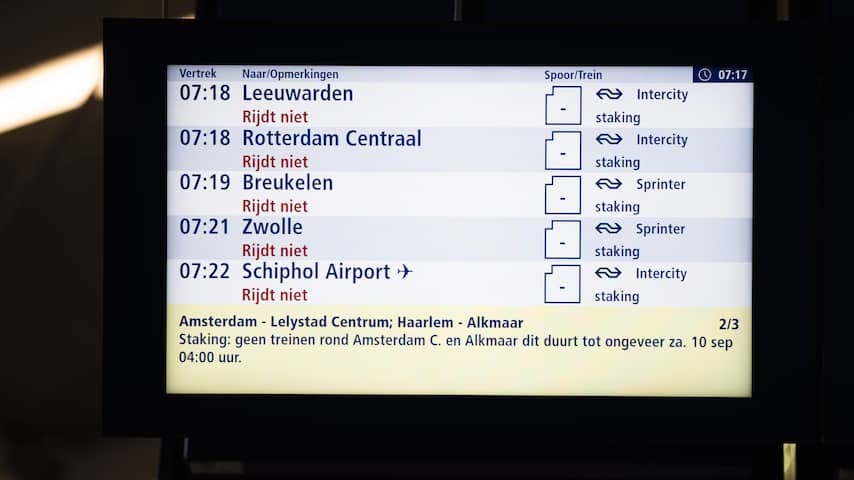
NS staff are once again halting work in parts of the Netherlands today, causing many trains to not run. Readers have many questions, for example, about union demands and the impact of the strike. NU.nl presented your most frequently asked questions to economics editor Ertan Basekin.
What are the expectations for upcoming strikes? When will the strike be over?
“The NS and the unions have been at odds for months. After 4.5 months of negotiations, both parties are unable to reach a new collective labor agreement. The unions are demanding a significant wage increase, as they believe that NS staff should be compensated for the high inflation.”
“The NS is not going beyond a wage offer of 2.55 percent per year. The unions do not agree with this and will increase the actions in the coming period.”
What happens if the NS and the unions do not reach an agreement? Will the strikes continue?
“The actions and strikes will continue anyway. It is just not yet known in what form. So far, they are mainly regional actions. But it is certainly not excluded that NS staff will also conduct national actions next week, and thus no trains will run again throughout the Netherlands.”
Is it understandable that staff go on strike, despite the NS offer of a 6 percent wage increase?
“The NS wage offer indeed amounts to 6 percent over 27 months. But spread over the period, that amounts to an average of 2.55 percent per year. And the NS staff is not satisfied with that, because the wage increase is lower than the current inflation of 3.3 percent. Or, as the unions reason: the staff will lose purchasing power.”
Why do they choose not to run the trains instead of not checking tickets?
“The suffering that the strike causes to travelers is of course a consideration. But in order to give force to demands in the collective labor agreement negotiations, the unions still choose to strike. Many NS employees are members of the unions and the willingness to strike among the staff is also there.”
“Not checking tickets or opening gates would cause less suffering and be more playful. But that is not possible just like that, experts say in the article below.”
Are the wages and working conditions of NS staff really so bad compared to similar work?
“No, but still there is dissatisfaction. For example, an employee who joins the service, also from the beginning of the training, receives a starting salary of between 2,532.24 and 2,959.92 euros gross per month for a working week of 36 hours. A conductor can grow to a salary of up to 3,784.68 euros and a machinist to 4,070.88 euros.”
“The conflict is not only about the wage, but also about other working conditions. For example, the employees also want a scheme to stop working earlier, the so-called early retirement. NS employees mainly complain about the high workload and indicate that they often have to deal with irregular services and aggression at work.”
Almost everyone suffers from inflation, why is only NS staff striking on such a large scale?
“It is not that only NS staff is striking. Employees from different sectors are willing to stop working. Only a strike at the NS is much more visible nationally than, for example, at the garage workers, who recently also stopped working. That is why the unions like to resort to the right to strike in negotiations with the NS.”
Why is it not mandatory in the Netherlands to run a minimum number of trains? In countries around us, that is regulated in this way.
“Trains also run here during a national strike between Amsterdam and Schiphol to prevent chaos and financial damage for the airport and the airlines. Although there is only a strike in the north and south of the country on Friday. So no trains run there. Via the link below you can see a map with where the trains are still running.
“It is certainly not the case that in countries around us the trains rarely stand still due to strikes. Recently there has been a significant strike at the railways in Germany and Belgium.”
How often are NS employees allowed to strike in this way?
“Employees may strike as often as necessary to get their demands met, union FNV says. The right to strike is a fundamental right, although it is not explicitly enshrined in the constitution, but based on the European Social Charter.”
“A judge may prohibit a strike if it is not announced on time, such as the previously planned strike for yesterday, if negotiations are still in full swing or if the consequences are too great.”
What influence can politics have on the NS and on the strikes?
“By making extra money available. With this, The Hague can prevent the NS from having to make train tickets much more expensive to pay higher wages. That also happened last year.”
“But the chance that national politics will come up with an extra contribution again is rather small. However, under pressure, a mediator can be appointed to encourage the NS and unions to reach an agreement after all. And the trains run again daily.”